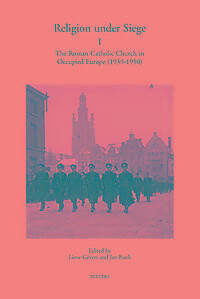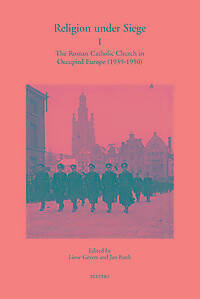
En raison d'une grêve chez bpost, votre commande pourrait être retardée. Vous avez besoin d’un livre rapidement ? Nos magasins vous accueillent à bras ouverts !
- Retrait gratuit dans votre magasin Club
- 7.000.000 titres dans notre catalogue
- Payer en toute sécurité
- Toujours un magasin près de chez vous
En raison de la grêve chez bpost, votre commande pourrait être retardée. Vous avez besoin d’un livre rapidement ? Nos magasins vous accueillent à bras ouverts !
- Retrait gratuit dans votre magasin Club
- 7.000.0000 titres dans notre catalogue
- Payer en toute sécurité
- Toujours un magasin près de chez vous
54,00 €
+ 108 points
Description
The stance taken by the Catholic Church in occupied Europe during World War II remains a significant focal point of historical research. In the last ten years we have been confronted with a resurgence of the so-called 'Pius-war', the frequently emotional polemic surrounding the justification or absence thereof of the role of Pope Pius XII, the head of the Catholic Church at the time. The work presented here, however, focuses on the role of the local churches rather than that of the Pope and the Vatican. Its goal is to shed light more specifically on the position maintained by the Catholic bishops, clergy and faithful in a variety of European countries under occupation throughout the war. The local churches are approached from a political-social, institutional and ideological perspective. This collection of essays represents the results of a research project established under the auspices of the European Science Foundation entitled 'The Impact of National Socialist and Fascist Occupation in Europe' (1999-2005). Within the broader framework of the project, research into the aspect of Church and Religion was scribed more specifically to Team 2 'The Continuity of the Churches'. The team strove to reach as broad a spectrum possible, both with respect to the churches and religions in Europe (Catholicism, Protestantism, Orthodoxy, and to a limited degree, Islam) as the various regions of the European continent (North, West, Central and (South) East). The present volume contains the research results presented in relation to the Catholic Church. Developments in Central and Eastern Europe are given priority, in particular in Slovenia, Croatia, Slovakia, Poland and Lithuania. In addition, a number of articles endeavour to shed light on developments in Western Europe as in Belgium, the Netherlands, France and Austria. The goal of the present volume is to stimulate an ongoing comparative study of the attitude of the Catholic Church during the Second World War from a European perspective. Together with a parallel volume that deals with the Protestant and Orthodox churches, this approach can be extended to include other ecclesial denominations and religions in Europe. While significant differences exist between the various countries and denominations, several similar patterns of approach are also strikingly evident.
Spécifications
Parties prenantes
- Auteur(s) :
- Editeur:
Contenu
- Nombre de pages :
- 346
- Langue:
- Anglais
- Collection :
- Tome:
- n° 56
Caractéristiques
- EAN:
- 9789042919327
- Date de parution :
- 31-12-07
- Format:
- Livre broché
- Format numérique:
- Trade paperback (VS)
- Dimensions :
- 163 mm x 244 mm
- Poids :
- 576 g

Les avis
Nous publions uniquement les avis qui respectent les conditions requises. Consultez nos conditions pour les avis.






